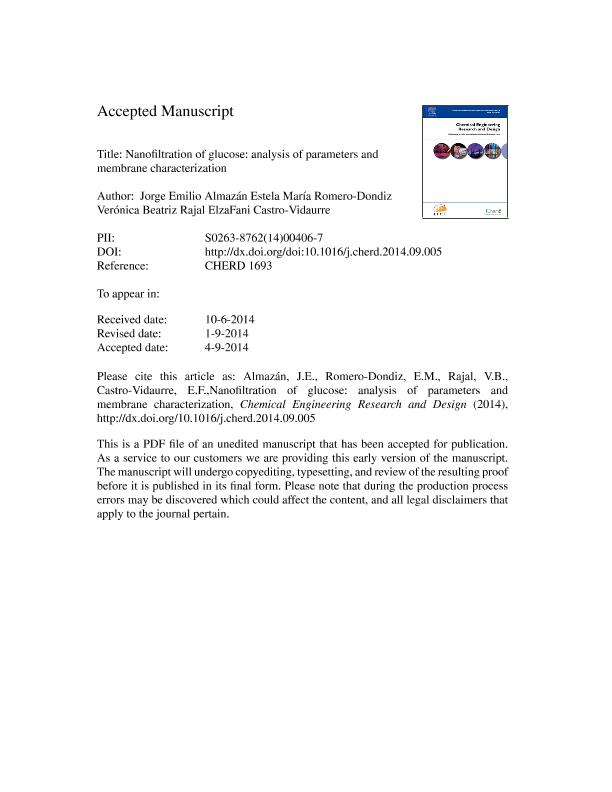Mostrar el registro sencillo del ítem
dc.contributor.author
Almazán, Jorge Emilio

dc.contributor.author
Romero Dondiz, Estela María

dc.contributor.author
Rajal, Verónica Beatriz

dc.contributor.author
Castro Vidaurre, Elza Fani

dc.date.available
2017-08-10T22:44:39Z
dc.date.issued
2014-09
dc.identifier.citation
Almazán, Jorge Emilio; Romero Dondiz, Estela María; Rajal, Verónica Beatriz; Castro Vidaurre, Elza Fani; Nanofiltration of glucose: Analysis of parameters and membrane characterization; Elsevier; Chemical Engineering Research & Design; 94; 9-2014; 485-493
dc.identifier.issn
0263-8762
dc.identifier.uri
http://hdl.handle.net/11336/22154
dc.description.abstract
Membrane characterization and modeling of nanofiltration processes of uncharged solutes are of special interest for the food industry. In this work two commercial membranes, DK and DL, were used to concentrate glucose solutions. Membranes were characterized according hydrophobicity, thickness, porosity, and hydraulic permeability. The influence of pressure and concentration of glucose on the permeate flux and rejection were studied. Both membranes presented a great potential for the food industry due to their high rejection of glucose. The osmotic pressure model was combined with film theory and the real driven force was calculated taking into account the osmotic pressure and the concentration polarization. Both phenomena influenced the process (concentration polarization only in the most dilute solutions at low pressure) and the permeability for glucose solutions was similar to the hydraulic permeability. A mathematical model based on the Donnan-Steric Pore Model was used to determine the pore radius and the effective thickness of both membranes. As the concentration inside the pore (needed for the calculations) is difficult to measure experimentally, various alternatives were proposed. The average of the concentration at the interface and permeate best fitted the experimental data. The model was applied successfully; the maximum error was 8% within the range of concentrations (5–100 g/L) for the DL membrane and 5% for the DK membrane up to 50 g/L.
dc.format
application/pdf
dc.language.iso
eng
dc.publisher
Elsevier

dc.rights
info:eu-repo/semantics/openAccess
dc.rights.uri
https://creativecommons.org/licenses/by-nc-sa/2.5/ar/
dc.subject
Nanofiltration
dc.subject
Glucose
dc.subject
Osmotic Pressure Model
dc.subject
Concentration Polarization
dc.subject.classification
Otras Ingeniería Química

dc.subject.classification
Ingeniería Química

dc.subject.classification
INGENIERÍAS Y TECNOLOGÍAS

dc.title
Nanofiltration of glucose: Analysis of parameters and membrane characterization
dc.type
info:eu-repo/semantics/article
dc.type
info:ar-repo/semantics/artículo
dc.type
info:eu-repo/semantics/publishedVersion
dc.date.updated
2016-12-16T16:42:06Z
dc.journal.volume
94
dc.journal.pagination
485-493
dc.journal.pais
Países Bajos

dc.journal.ciudad
Amsterdam
dc.description.fil
Fil: Almazán, Jorge Emilio. Consejo Nacional de Investigaciones Científicas y Técnicas. Centro Científico Tecnológico Conicet - Salta. Instituto de Investigaciones Para la Industria Química. Universidad Nacional de Salta. Facultad de Ingeniería. Instituto de Investigaciones Para la Industria Química; Argentina
dc.description.fil
Fil: Romero Dondiz, Estela María. Consejo Nacional de Investigaciones Científicas y Técnicas. Centro Científico Tecnológico Conicet - Salta. Instituto de Investigaciones Para la Industria Química. Universidad Nacional de Salta. Facultad de Ingeniería. Instituto de Investigaciones Para la Industria Química; Argentina
dc.description.fil
Fil: Rajal, Verónica Beatriz. Consejo Nacional de Investigaciones Científicas y Técnicas. Centro Científico Tecnológico Conicet - Salta. Instituto de Investigaciones Para la Industria Química. Universidad Nacional de Salta. Facultad de Ingeniería. Instituto de Investigaciones Para la Industria Química; Argentina
dc.description.fil
Fil: Castro Vidaurre, Elza Fani. Consejo Nacional de Investigaciones Científicas y Técnicas. Centro Científico Tecnológico Conicet - Salta. Instituto de Investigaciones Para la Industria Química. Universidad Nacional de Salta. Facultad de Ingeniería. Instituto de Investigaciones Para la Industria Química; Argentina
dc.journal.title
Chemical Engineering Research & Design

dc.relation.alternativeid
info:eu-repo/semantics/altIdentifier/doi/http://dx.doi.org/10.1016/j.cherd.2014.09.005
dc.relation.alternativeid
info:eu-repo/semantics/altIdentifier/url/http://www.sciencedirect.com/science/article/pii/S0263876214004067
Archivos asociados
